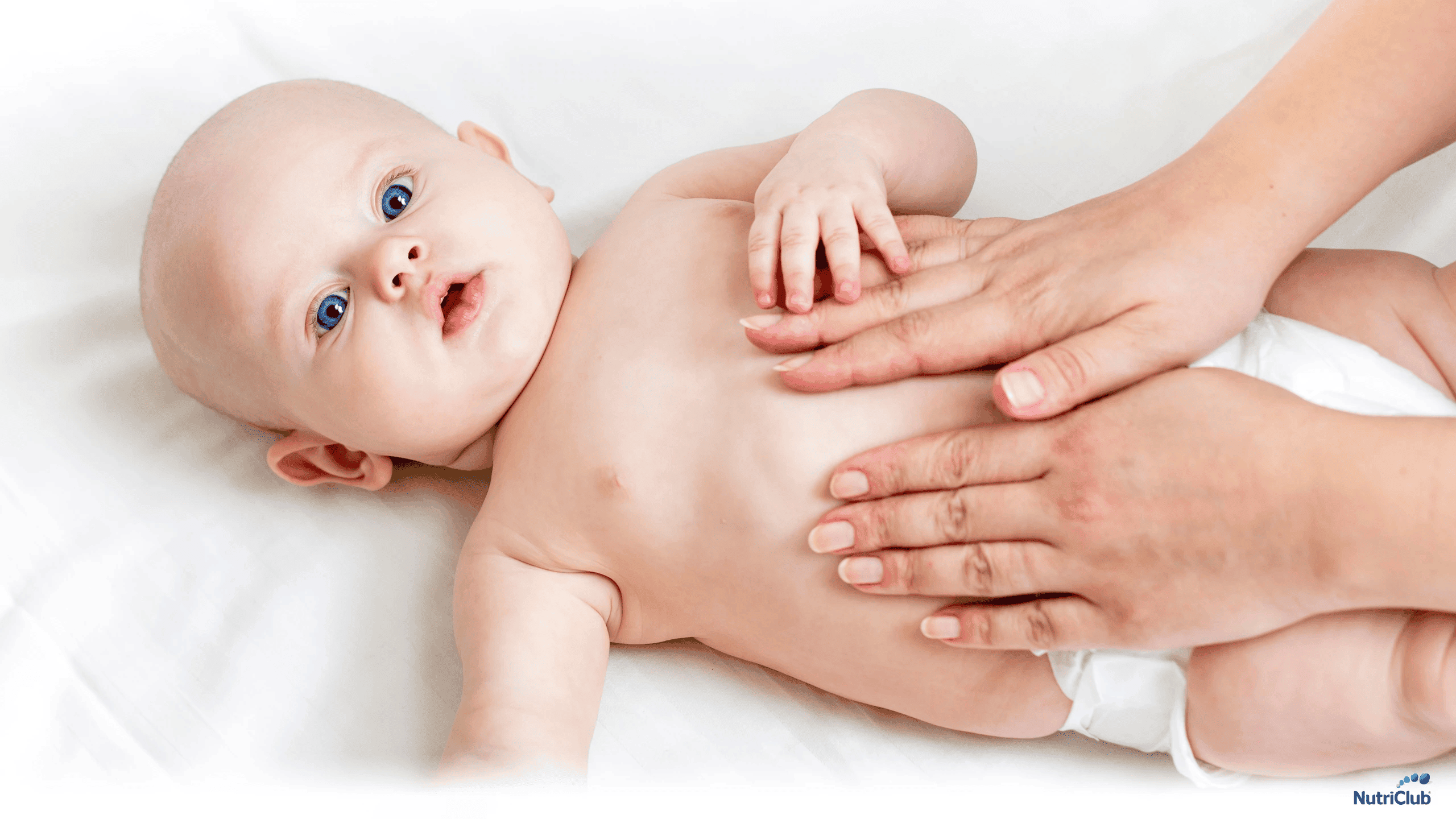Constipation in babies can be difficult to deal with. After all, it’s never good to see your baby uncomfortable or in pain. But try not to worry. Child and newborn baby constipation is relatively common.
Here we take a look at what causes constipation in babies, how to relieve constipation in babies, and baby constipation treatment.
Baby Constipation

What causes constipation in babies?
There are a number of possible causes of constipation in infants including1:
- If your baby has been unwell and not eating or drinking as much as they usually would, they could be dehydrated. This lack of food and fluid intake could lead to them becoming constipated.
- A change in your baby’s diet. Remember that your baby’s digestive system is brand new, so adjusting to new foods takes practice.
- Low fibre intake. If your baby is weaning, make sure they’re eating a varied diet including fruits, vegetables and cereals, all of which are great sources of fibre. Not doing so might lead to constipation.
It’s also possible that there’s a psychological reason for your baby’s constipation. For example, if it hurts your baby to poo (perhaps because of a small tear in the anal canal, called a fissure), then to avoid the pain they might stop themselves from going. Following on from that, if babies get into the habit of withholding stools for any reason, then it can become a habit that they continue with.
Rest assured that most cases of baby constipation can be eased with some simple adjustments.
Symptoms of constipation in babies
You’ll usually be able to recognise if your baby has constipation because of the following signs and symptoms2:
- Delayed or infrequent stools (less than three times per week).
- The stools are small, dry and hard.
- Your baby is in pain and has difficulty going to the toilet.
- Foul-smelling wind or stools.
- Excessive wind.
- Poor appetite.
- A lack of energy and lethargy.
- A firm tummy.
If your baby is showing any of the above signs of being constipated, you should talk to your health visitor or GP. They’ll be able to provide guidance on baby constipation relief and whether any baby constipation treatment is required.
If your baby is less than a year old, our Baby Symptom Checker is a useful tool to help you identify the signs of constipation in babies.
How to help constipated babies
How to help a constipated baby is a question many parents find themselves asking. If you’re one of them, you’re most definitely not alone. But what are the best forms of baby constipation relief?
Here are a couple of practical tips on how to relieve constipation in babies2:
- Gently move your baby’s legs as if they’re riding a bicycle.
- You could also try a baby tummy massage for constipation. This involves gently and carefully massaging your baby’s tummy to help stimulate their bowels.
Physical exercise also helps to get your child’s digestive system moving, so encourage active play, followed by a nice warm bath - another way to ease the symptoms of baby constipation.
These steps can be really helpful in getting things on the move, but if you don’t see any improvement, have a chat with your GP or health visitor.
Constipation in breastfed babies
Can breastfed babies get constipated? The simple answer is yes. Whilst constipation is rare in babies who are solely breastfed3, it can still happen.
Remember that exclusively breastfed babies don't need anything other than breastmilk (including water) until they've started eating solid foods. It’s recommended that this doesn’t happen until your baby is around 6 months of age4.
Constipation in formula fed babies
Constipation tends to be more common in formula fed babies. If you’ve recently started giving your baby formula milk and you notice a change in their bowel movements, it’s likely that their tummy is simply adapting to the change.
If you find yourself dealing with formula fed baby constipation, make sure that you’re preparing feeds according to the manufacturer's instructions. It’s never advisable to reduce or increase the amount of powder you use, as too little won’t provide the nourishment they need, and too much can cause constipation5 or make your baby ill. You could also try giving your baby cooled, boiled water in between their normal feeds6.
If symptoms persist and you need further advice, don’t hesitate to speak to your health visitor, pharmacist or GP about other nutritional solutions available to help manage your baby’s constipation.
Constipation in weaned babies
If your baby has started weaning, you might find that the change in their diet results in a change to their toilet habits, too. So if you suspect that your baby is constipated and you’ve just started the weaning journey, this could be a contributory factor as your baby’s digestive system gets used to the change7. It’s very important that your baby get’s enough fibre in their diet, so if your baby is constipated, you could try adding more fibre in the form of cereals, prunes and peas alongside their regular breast or formula milk intake8.
Baby massages to relieve constipation
Giving your baby a tummy massage can be an easy and practical way to ease their discomfort. It may help to stimulate their digestive system and get rid of trapped wind.
When giving your baby a tummy massage for constipation, be sure to:
- Work in a clockwise direction.
- Avoid the ribcage and make sure all strokes are on their tummy.
- Lighten the pressure when you stroke over their bladder.
An easy and relaxing massage technique which might help relieve baby constipation is to gently use your fingertips to stroke a large, circular motion around their tummy to soothe them9.
What can I give a constipated baby?
If you’re wondering how to help a baby with constipation, depending on whether they’re breast fed, bottle fed or weaning, there are a few things you can give them in order to ease the symptoms10.
- Offer solely breastfed babies plenty of feeds to keep them hydrated.
- If your baby is formula fed, offer them small amounts of water in between their regular feeds.
- Once they’ve started weaning, offer your baby a variety of fruits and vegetables to get plenty of fibre into their system.
Baby foods that help with constipation
Once they’ve started weaning, there’s a wide variety of foods your baby can eat to help ease the symptoms of constipation. So, what are the baby foods that help with constipation?
Fruit
Fruits7 such as pears without their skin, fresh, stewed or tinned, are good for your baby's digestive system. As are strained fruit juices, like tomato, for example.
Vegetables
Try giving your baby a mixture of vegetables in their diet, including peas, parsnips, mixed vegetables (from frozen), green beans, canned sweetcorn and broccoli.
Other baby foods that help with constipation
Other foods to include as part of your baby’s varied weaning diet include things like cereals, porridge and wholemeal bread.
How much cooled boiled water should babies with constipation have?
If your baby has constipation and is bottle fed or eating solid foods, giving them cooled boiled water in between feeds can be an effective way of helping them to poo.
Start with small amounts, around 30 - 40mls12 in between feeds and see if this helps to make a difference.
Why you shouldn’t give your baby sugar water for constipation
It’s not advisable to give your baby sugar water as a remedy for constipation. In fact, adding sugar or sweeteners to your child’s diet should be avoided until they’re at least four years old due to the risk of tooth decay13.
Prune juice for a baby with constipation
It’s not advisable to give your baby prune juice, even if it’s diluted, if your baby is under nine months old. This is because it contains a natural bowel irritant14. If your baby is less than 12 months old, always consult your doctor or health visitor about how much prune juice to give them and if it’s advisable (even if they’re older than nine months of age) in order to ensure they’re not having too much.
At the end of the day, baby constipation is not uncommon and is usually nothing to worry about. In most cases, by trying the tips above you’ll see an improvement in your baby’s condition, but remember that it may take a couple of days to get things moving again.
If things don't improve, speak to your health visitor, pharmacist or GP for more information and next steps and solutions.
Related articles

Get in touch with our Careline experts
Our nutritionists and feeding advisors are always on hand to talk about feeding your baby. So if you have a question, just get in touch
- NICE. Constipation in children and young people: diagnosis and management [Online]. 2010. Available at: www.nice.org.uk/guidance/cg99 [Accessed: April 2016]
- NHS Start 4 Life. Breastfeeding challenges - Constipation [Online]. Available at: https://www.nhs.uk/start4life/baby/breastfeeding/breastfeeding-challenges/constipation/ [Accessed March 2021].
- National Health Service (NHS) Derbyshire Community Health Services. Advice and guidance: bowel movements [online]. Available at http://www.dchs.nhs.uk/home/our-services/find_services_by_topic/healthvisiting/advice_guidance/hvs_bowel_movements#:~:text=A%20simple%20way%20to%20manage,(30%20%E2%80%93%2040%20mls). Accessed April 2021.
- NHS. Drinks and cups for babies and young children [Online]. 2018. Available at: https://www.nhs.uk/conditions/pregnancy-and-baby/drinks-and-cups-children/ [Accessed March 2021]
- National Health Service (NHS). How to make up baby formula [online] 2019. Available at https://www.nhs.uk/conditions/baby/breastfeeding-and-bottle-feeding/bottle-feeding/making-up-baby-formula/. Accessed March 2021.
- NHS Start 4 Life. Breastfeeding challenges - Constipation [Online]. Available at: https://www.nhs.uk/start4life/baby/breastfeeding/breastfeeding-challenges/constipation/ [Accessed March 2021].
- NICE. Constipation in children and young people: diagnosis and management [Online]. 2010. Available at: www.nice.org.uk/guidance/cg99 [Accessed: April 2016].
- healthline. Constipation in breastfed babies: symptoms, causes and treatment [online] 2019. Available at https://www.healthline.com/health/constipation-in-breastfeeding-baby#constipation-remedies. Accessed March 2021.
- Tommys. Baby massage tips and how to get started [Online]. 2019. Available at: https://www.tommys.org/pregnancy-information/about-us/tommys-midwives-blog/baby-massage [Accessed March 2021]
- National Health Service (NHS). Constipation in babies [online] 2020. Available at https://www.nhs.uk/conditions/baby/health/constipation-in-children/. Accessed March 2021.
- National Health Service (NHS) West Suffolk NHS Foundation Trust patient information [online] 2020. Available at https://www.wsh.nhs.uk/CMS-Documents/Patient-leaflets/ColorectalandStomaCare/5146-4-Constipation.pdf. Accessed April 2021.
- National Health Service (NHS) Derbyshire Community Health Services. Advice and guidance: bowel movements [online]. Available at http://www.dchs.nhs.uk/home/our-services/find_services_by_topic/healthvisiting/advice_guidance/hvs_bowel_movements#:~:text=A%20simple%20way%20to%20manage,(30%20%E2%80%93%2040%20mls). Accessed April 2021.
- National Health Service (NHS). Foods to avoid giving babies and young children [online] 2018. Available at https://www.nhs.uk/conditions/baby/weaning-and-feeding/foods-to-avoid-giving-babies-and-young-children/. Accessed April 2021.
- National Health Service (NHS) Derbyshire Community Health Services. Advice and guidance: bowel movements [online]. Available at http://www.dchs.nhs.uk/home/our-services/find_services_by_topic/healthvisiting/advice_guidance/hvs_bowel_movements#:~:text=A%20simple%20way%20to%20manage,(30%20%E2%80%93%2040%20mls). Accessed April 2021.
Last reviewed: 09th June 2021
Reviewed by Oriana Hernandez Carrion



?ts=1701285595274&dpr=off)